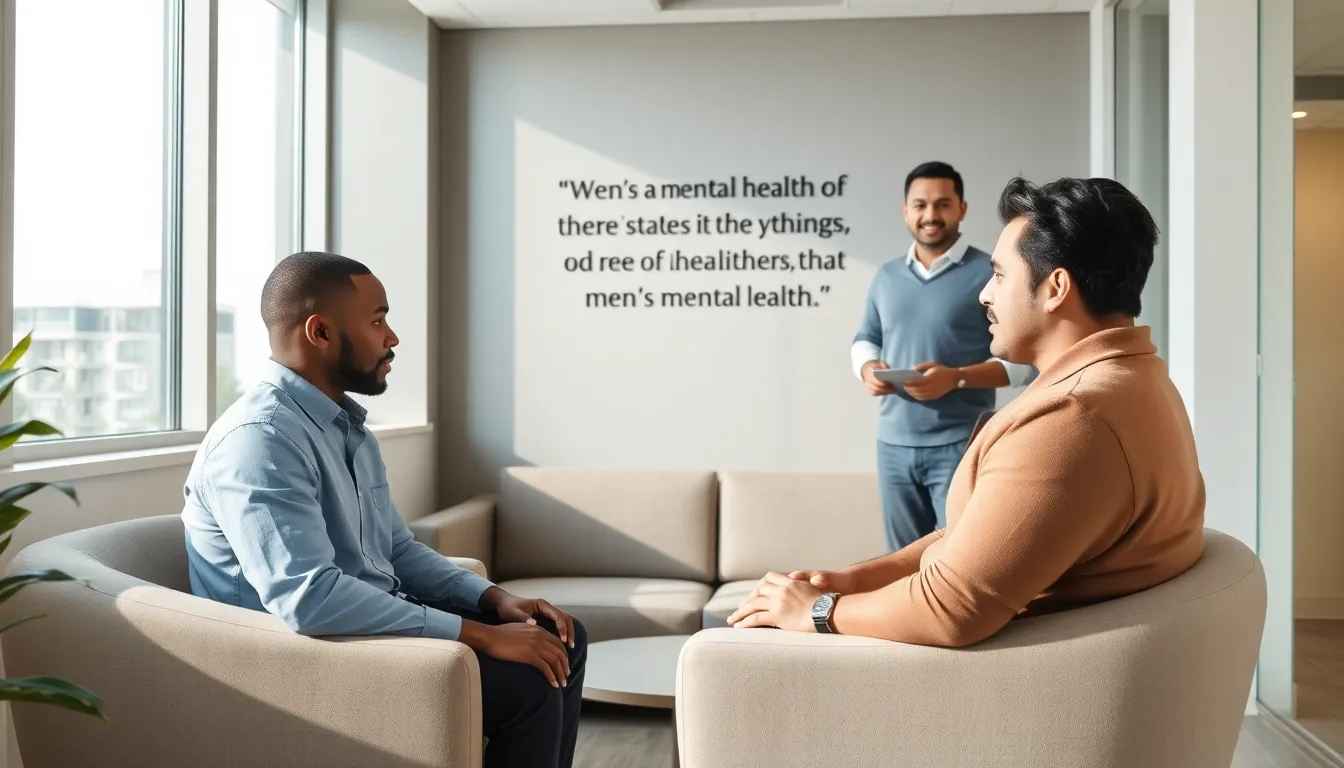When it comes to mental health, the conversation often skims over the crucial fact that men have their own unique struggles. Picture this: A dad in the supermarket, juggling a screaming toddler and a shopping list while silently battling anxiety. It’s time to acknowledge that men face significant mental health challenges, but far too often, they’re dismissed or minimized. Let’s break down the barriers, tackle the stigma, and open the floodgates of conversation. After all, men’s mental health matters just as much as anyone else’s, and it’s time we talked about it.
Table of Contents
ToggleUnderstanding Men’s Mental Health Issues

Men often grapple with various mental health challenges, yet these issues frequently go unreported or ignored. Common challenges include depression, anxiety, and stress-related disorders. Men may also experience anger, substance abuse, and suicidal thoughts, often hiding their struggles behind a facade of strength.
Common Mental Health Challenges Faced by Men
Research indicates that men are less likely than women to seek help for mental health issues. They often suppress their emotions, thinking it’s a sign of weakness. This harmful belief can lead to serious consequences, including substance abuse and even suicide. Statistics from the National Institute of Mental Health reveal that men are three times more likely to commit suicide than women. It’s essential to shed light on these often-overlooked issues to initiate meaningful conversations.
Stigma Surrounding Men’s Mental Health
Nobody wants to be the guy who shows vulnerability, right? Society has ingrained the idea that men should be stoic, strong, and largely unaffected by emotions. This stigma surrounding men’s mental health can be a significant barrier to obtaining help.
Breaking the Stigma: Encouraging Open Conversations
To combat this, men must engage in conversations that promote understanding and acceptance around mental health. Encouraging men to share their experiences can create a safe space where they feel secure discussing their challenges. Supportive friends and family play a critical role in fostering this open dialogue. Remember, it’s okay not to be okay, and sharing that reality can be the first step towards healing.
The Importance of Seeking Help
It’s an undeniable truth: seeking help is a strength, not a weakness. But why do so many men hesitate to reach out?
Types of Professional Help Available
Various types of professional help are available for those who need support. From therapy to support groups, options abound to cater to different preferences. Cognitive-behavioral therapy (CBT) is one effective method that helps reframe negative thought patterns. Other options include group therapy, where men can express themselves among peers, offering relief and understanding.
Reaching out to mental health professionals can change someone’s life for the better. Finding the right fit, whether it’s a therapist, counselor, or support group, can pave the way for recovery. Encouraging men to seek assistance can help diminish the stigma that surrounds mental health.
Self-Care Strategies for Men’s Mental Well-Being
Self-care isn’t just bubble baths and face masks: it’s a critical part of maintaining mental health. Men can adopt practical strategies to enhance their mental well-being.
Building a Support Network
Creating a robust support network is essential for emotional health. Friends, family, and even coworkers can provide a lifeline of support. Men can lean on these relationships to process their emotions and experiences. Having regular check-ins can ensure that everyone is doing well and feeling supported.
Some might find solace in hobbies or physical activities. Engaging in regular exercise can help reduce symptoms of depression and anxiety. Also, contributing to community events or volunteering can enhance feelings of purpose and connection in life.
Promoting Mental Health Awareness in Communities
Communities play a critical role in dismantling the stigma surrounding men’s mental health. Via educational programs, workshops, or community events, individuals can become advocates for change. Promoting mental health awareness helps to build resilience and foster understanding.
By collaborating with local organizations, it’s possible to create resources that resonate with men. Campaigns promoting open discussion can encourage individuals to prioritize their mental health. Approaching this issue collectively allows communities to create a culture of support that normalizes seeking help.



